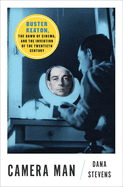
Film critic Dana Stevens's Camera Man takes on three substantial tasks and succeeds masterfully. She creates a compelling biography portraying Buster Keaton's volatile life, astutely assesses his films and puts both in the context of world events and innovations that were happening at the time. Keaton was successful in three different mediums at their creative peaks: first his 17 years as a juvenile slapstick prodigy in vaudeville, then silent films and finally TV during its experimental early years. But Keaton's successful career masked a troubled private life. "He was an atrociously terrible businessman, an indifferent celebrity, and, until late in his life, a dilatory husband and father at best," writes Stevens.
Keaton was an innovative filmmaker who exercised complete artistic control over his films. In his heyday, the 1920s, he produced, directed and starred in comedic masterpieces like The General, The Navigator and Sherlock Jr. Though he was somewhat overshadowed by Charlie Chaplin and Harold Lloyd, today critics regard him as one of the greatest comic filmmakers of all time. His directorial career was cut short by the advent of sound, by losing his independence after moving to MGM studios and by his alcoholism. He became sober within a few years but his return to MGM was as a script doctor and, later, supporting player.
Camera Man feels fresh in its research because Stevens is exceptionally adept at sifting through decades of myths to find the truth. Even Keaton's own 1960 as-told-to memoir is corrected. Camera Man crafts a compelling and surprisingly upbeat story of a beloved, troubled but resilient comedian. --Kevin Howell, independent reviewer and marketing consultant

